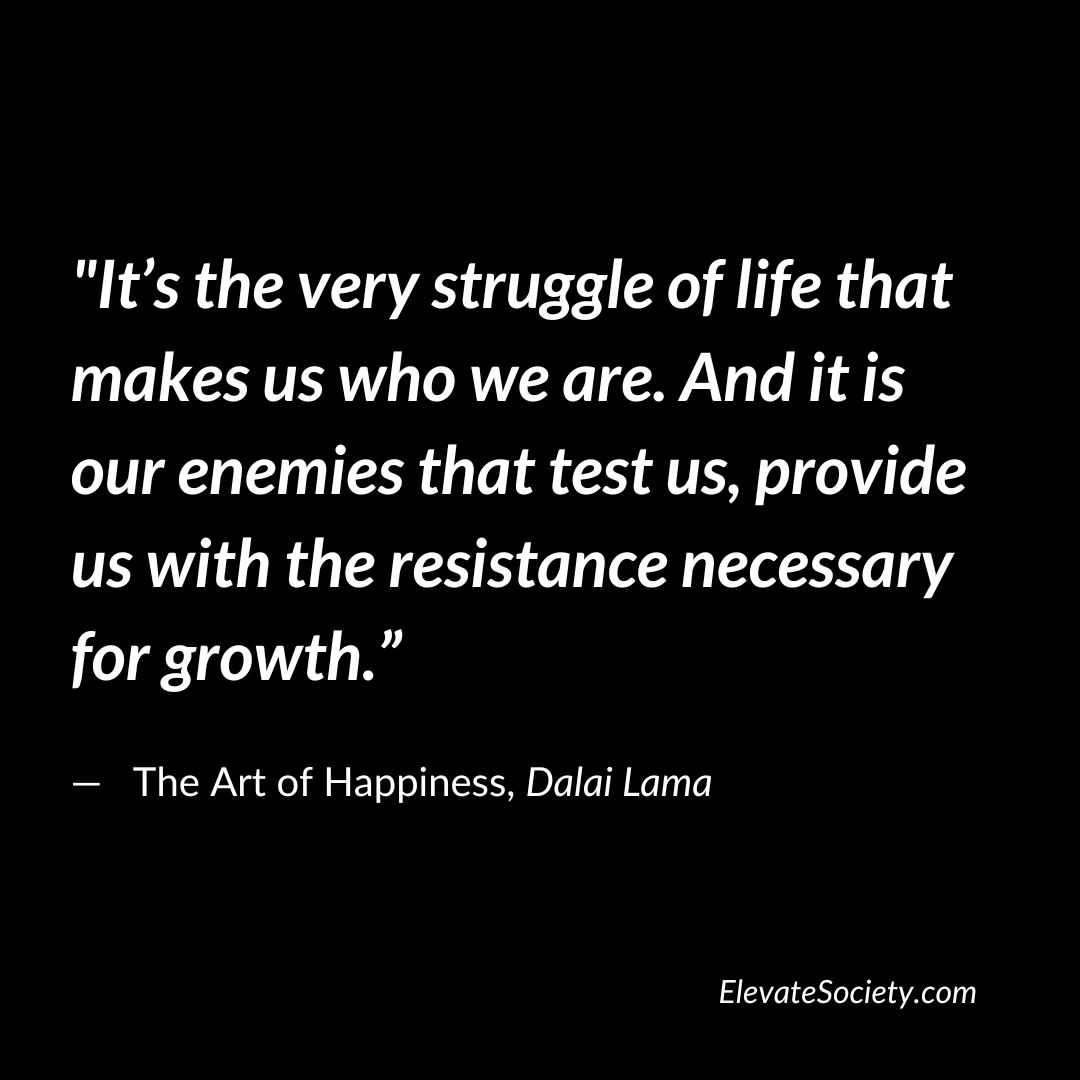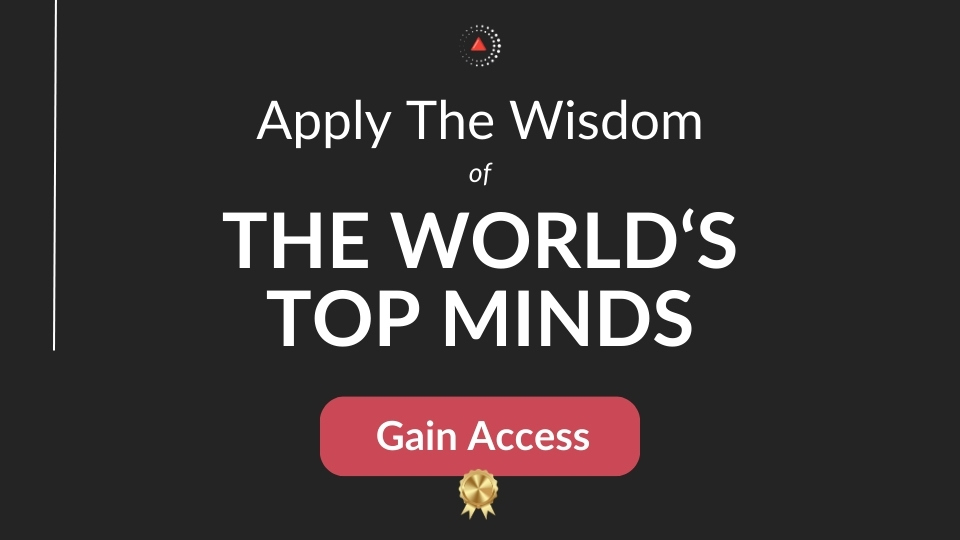The Art of Happiness: Summary Review & Takeaways
This is a summary review of The Art of Happiness containing key details about the book.
What is The Art of Happiness About?
The Art of Happiness is a personal development guide for a western audience, combining the Dalai Lama's eastern spiritual tradition with Dr Howard C. Cutler's western perspective. Covering all key areas of human experience, they apply the principles of Tibetan Buddhism to everyday problems and reveal how one can find balance and complete spiritual and mental freedom.
The Art of Happiness main argument is that happiness is determined more by the state of one's mind than by one's external conditions, circumstances, or events (at least once one's basic survival needs are met) and that happiness can be achieved through the systematic training of our hearts and minds.
Who is the Author of The Art of Happiness?
The Art of Happiness is a book by the 14th Dalai Lama and Howard Cutler, a psychiatrist who posed questions to the Dalai Lama. Howard C. Cutler is a psychiatrist and an expert in the science of human happiness.
What are key takeaways from The Art of Happiness?
Long lasting happiness comes from having the right state of mind rather than external circumstances. Sure, an amazing vacation, party, or simply a phone call from a friend can make you happy for a short while, but you'll know from experience that you soon go back to feeling 'normal'. That's why you must systematically train your brain to be happier. It's a slow process but you'll eventually feel an inner calmness that allows you to find joy and happiness no matter what is going on around you.
Takeaway #1 Compassion
Compassion is key when it comes to happiness. Compassion means being in a state of mind that is not aggressive, one where you wish to see others free from suffering. To truly be compassionate, you wish all people and creatures to live a life free of suffering rather than focusing just on those around you. Practice compassion by feeling empathy for others. If you find this difficult and usually go to a place of anger rather than empathy, consider what you and the other person have in common, then put yourself in their shoes and consider how you would feel if you were in the same boat.
Takeaway #2 Intimacy
In the Western world, we often associate intimacy with our romantic partner meaning that when you're single you feel like something is missing. It doesn't have to be that way when you stop associating intimacy with sex. It's highly possible to feel intimacy with a wide range of people around you from friends, and family, teachers to work colleagues, you just have to connect with them over time, have an appreciation for them and respect them.
Takeaway #3 Religion & Spirituality
To be spiritual you do not have to be religious but being spiritual or religious will lead to greater happiness. Basic qualities such as goodness, compassion, and caring are all basic qualities that people can practice throughout the day no matter their religious beliefs. These acts bring us closer to humanity whilst helping us to feel more calm, relaxed, and ultimately, happier.
Takeaway #4 Suffering
Suffering is a natural cycle of life but unfortunately, we humans tend to enjoy wallowing in our suffering, making it bigger than it really is as we exclaim how terribly unlucky we are and play the victim card. That's not to say that ignoring or avoiding suffering is the answer, instead, we should aim to remove the mental cause of the suffering as fast as possible. It's important to learn not to resist change, not to try to cling on to people, possessions and negative events and thoughts as this only lengthens the feeling of suffering. Accept that life is in constant flux and people, things, and thoughts are always coming and going – When you let go of the pain and anger, the suffering will end.
Takeaway #5 Negativity
Harmful negative emotions such as anger and hatred are poison to our mind and should be beat using love, compassion, patience, tolerance, and generosity. CBT and meditation can help with the process of replacing negative thoughts with positive ones but it's a slow journey that cannot be rushed. Without knowing why you're changing your thoughts and indeed where the negative thoughts came from, you won't succeed in finding peace and happiness long term. That's why it's so important to shift your perspective and find the good in everything, even the most terrible times. Remember, no event, circumstance, or feeling is ever 100% negative.
What are the chapters in The Art of Happiness?
Chapter One -The Right to Happiness
Chapter Two - The Sources of Happiness
Chapter Three - Training the Mind for Happiness
Chapter Four - Reclaiming Our Innate Stae of Happiness
Chapter Five - A New Model for Intimacy
Chapter Six - Deepening Our Connection to Others
Chapter Seven - The Value and Benefits of Compassion
Chapter Eight - Facing Suffering
Chapter Nine - Self-Created Suffering
Chapter Ten - Shifting Perspective
Chapter Eleven - Finding Meaning in Pain and Suffering
Chapter Twelve - Bringing About Change
Chapter Thirteen - Dealing with Anger and Hatred
Chapter Fourteen - Dealing with Anxiety and Building Self- Esteem
Chapter Fifteen - Basic Spiritual Values
What are some of the main summary points from the book?
Here are some key summary points from the book:
- Happiness is within our control: The book emphasizes that happiness is not solely dependent on external circumstances but is largely influenced by our internal mindset and mental attitude. We have the ability to cultivate happiness by developing positive mental states and habits.
- The importance of compassion and altruism: The Dalai Lama highlights the significance of compassion and altruism in leading a happy life. He explains that by caring for others and acting selflessly, we not only benefit those around us but also experience a deep sense of fulfillment and inner peace.
- Cultivating a positive outlook: The book emphasizes the power of positive thinking and encourages readers to develop a positive mental outlook. It suggests focusing on gratitude, forgiveness, and acceptance of life's challenges as ways to foster a more positive mindset.
- The role of mindfulness: Mindfulness, the practice of being fully present in the moment, is emphasized as a key tool for finding happiness. The book encourages readers to cultivate mindfulness through meditation and other contemplative practices to develop a greater sense of awareness and clarity.
- Overcoming negative emotions: The authors discuss various negative emotions such as anger, fear, and anxiety and provide strategies for managing and overcoming them. They emphasize the importance of self-reflection and understanding the root causes of these emotions to effectively address them.
- Finding purpose and meaning: The book explores the importance of having a sense of purpose and meaning in life. It suggests that identifying and pursuing activities and goals that align with our values and interests can bring a deep sense of fulfillment and happiness.
- Balancing material and spiritual aspects of life: While acknowledging the role of material comfort and achievement, the book emphasizes the need to balance these with spiritual and emotional well-being. It encourages readers to seek happiness beyond material possessions and to focus on inner growth and development.
Book details
- Print length: 336 Pages
- Audiobook: 3 hrs and 18 mins
- Genre: Nonfiction, Philosophy, Spirituality, Self Help, Buddhism, Relationships, Personal Development
What is a good quote from The Art of Happiness?
 [Favorite Quote]: "It’s the very struggle of life that makes us who we are. And it is our enemies that test us, provide us with the resistance necessary for growth.” (Meaning)
[Favorite Quote]: "It’s the very struggle of life that makes us who we are. And it is our enemies that test us, provide us with the resistance necessary for growth.” (Meaning)
― Dalai Lama XIV, The Art of Happiness Quotes
* The summary points above have been concluded from the book and other public sources. The editor of this summary review made every effort to maintain information accuracy, including any published quotes, chapters, or takeaways
Chief Editor
 Tal Gur is an author, founder, and impact-driven entrepreneur at heart. After trading his daily grind for a life of his own daring design, he spent a decade pursuing 100 major life goals around the globe. His journey and most recent book, The Art of Fully Living, has led him to found Elevate Society.
Tal Gur is an author, founder, and impact-driven entrepreneur at heart. After trading his daily grind for a life of his own daring design, he spent a decade pursuing 100 major life goals around the globe. His journey and most recent book, The Art of Fully Living, has led him to found Elevate Society.


























